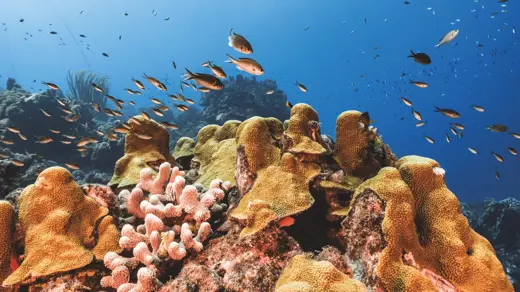Coral reefs are facing tremendous challenges due to climate change, man-made damage, invasive species, and disease. With so many reefs dying and coral bleaching becoming an increasing issue, perhaps humans would better understand the urgency of their protection if coral could simply speak and tell us what they need.
Here’s a glimpse at what they might say if they could communicate with us:
1. “Please get to know us better…”
If coral could talk, they’d want you to know they’re not plants, though they contain plant-like algae within them. They’re not rocks either, even though their skeletons resemble limestone. Coral are small sea creatures closely related to jellyfish. When you see a coral mass, it’s not just one individual, but a community of millions of tiny polyps—transparent, jelly-like beings that can be as small as a pinhead, living together as a single organism. Each polyp lives in its own tiny corallite and builds upon the skeletons of their deceased ancestors, forming the colorful, vibrant underwater cities that support an array of sea life.
2. “Please make our behavior easier to understand…”
Coral would ask marine scientists to simplify the language used to educate the public. For instance, terms like zooplankton and bacterioplankton may be difficult for the average person to understand when explaining what coral eats. The same goes for the complex term zooxanthellae, the microscopic algae that live within coral polyps and provide most of their nutrition through photosynthesis. Coral’s reproductive cycle is also quite intricate, with many species performing broadcast spawning—releasing eggs and sperm simultaneously, often synchronized with the lunar cycle. It’s a spectacular event worth witnessing for certified divers.
3. “Please admire us from afar…”
If coral could talk, they would ask us to keep our distance. Touching coral, even lightly, leaves behind harmful toxins that polyps can ingest, potentially causing illness. Standing or kicking sand on coral reefs can smother them, and hard pressure can crush these delicate creatures. Coral reefs are incredibly fragile, so it’s important to be conscious of our movements and behavior when swimming, snorkeling, or diving around them.
4. “Please do your part to keep our oceans clean…”
Coral would kindly ask that you don’t leave trash on beaches that could end up in the sea. Avoid using single-use plastics, which are harmful to the marine environment. Conserve water, recycle when possible, and use reef-safe sunscreen that doesn’t contain chemicals damaging to marine life. They would also urge you to leave behind dead coral or seashells you may find on the beach. These natural elements help prevent beach erosion. And lastly, avoid purchasing souvenirs made from living creatures found in the sea, as this impacts marine ecosystems.
5. “Please help the groups that help us!”
If coral could talk, they would encourage visitors to support non-profit organizations working to protect and restore coral reefs. Initiatives like beach and reef clean-ups, coral restoration projects, and educational programs are always in need of volunteers and donations. Adopting a coral is one way you can personally contribute to efforts to preserve and restore these vital ecosystems. By supporting these organizations, you’re directly aiding the reefs in their fight for survival.
https://www.myarubaguide.com/blogs/if-coral-could-talk























Discussion about this post